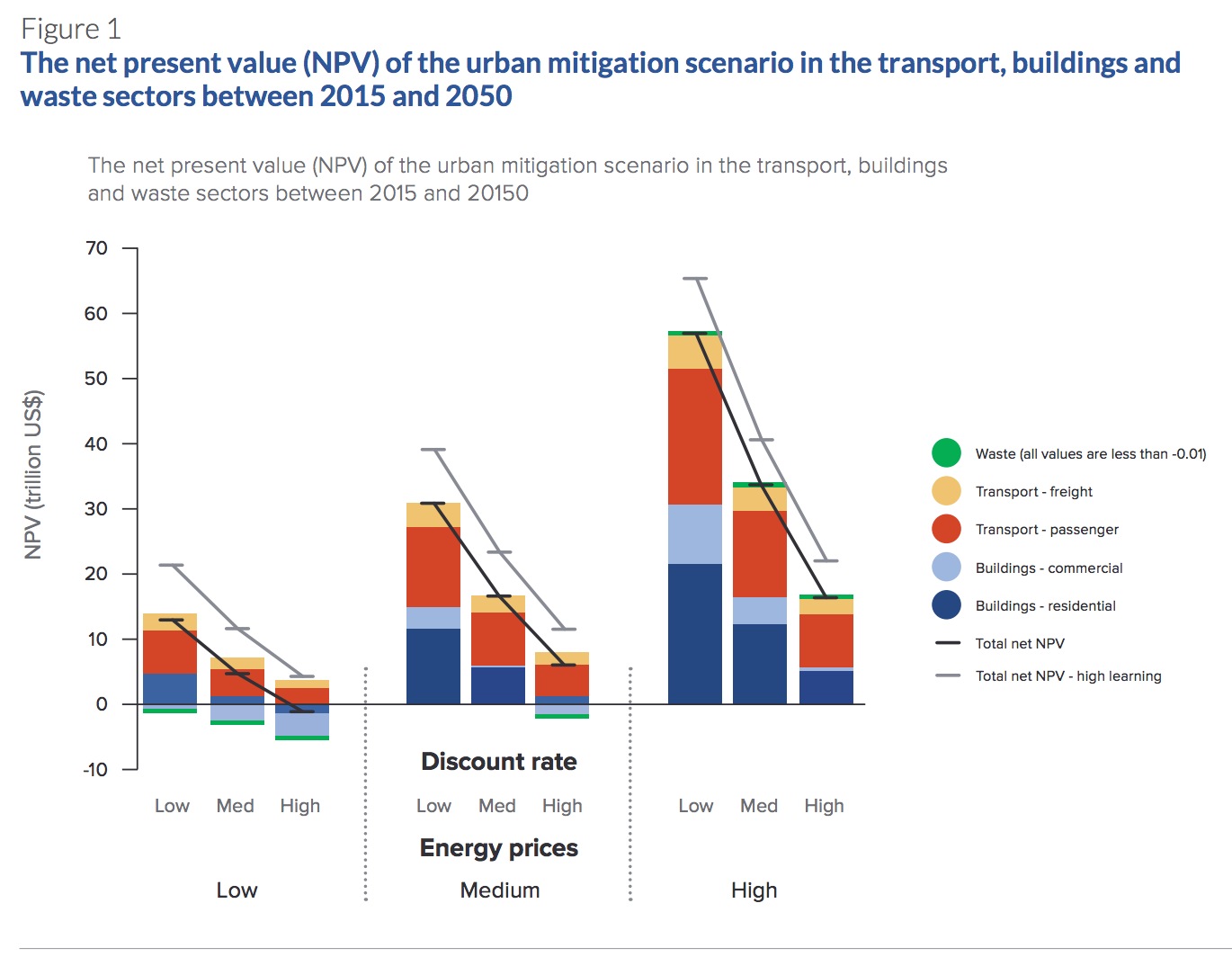THE GLOBAL COMMISSION ON THE ECONOMY AND CLIMATE
Overview
Cities are engines of economic growth and social change. About 85% of global GDP in 2015 was generated in cities. By 2050, two-thirds of the global population will live in urban areas. Compact, connected and efficient cities can generate stronger growth and job creation, alleviate poverty and reduce investment costs, as well as improve quality of life through lower air pollution and traffic congestion. Better, more resilient models of urban development are particularly critical for rapidly urbanizing cities in the developing world.
International city networks, such as the C40 Cities Climate Leadership Group, Local Governments for Sustainability (ICLEI) and United Cities and Local Governments (UCLG), are scaling up the sharing of best practices and developing initiatives to facilitate new flows of finance, enabling more ambitious action on climate change. Altogether, low-carbon urban actions available today could generate a stream of savings in the period to 2050 with a current value of US$16.6 trillion.
Recommendation
The Global Commission on the Economy and Climate recommends that cities commit to developing and implementing low-carbon urban development strategies by 2020, using where possible the framework of the Compact of Mayors, prioritising policies and investments in public, nonmotorised and low-emission transport, building efficiency, renewable energy and efficient waste management.
Donor agencies, city networks and organisations, multilateral and regional development banks and others should develop an integrated package of at least US$1 billion for technical assistance, capacity-building and finance to support commitments by the world’s largest 500 cities. The package could directly mobilise at least US$5–10 billion in private investment through project preparation support, and leverage significant further large-scale capital for a low-carbon urban transition. The package should build on existing leadership and efforts by cities using their own resources, and prioritise filling critical resource gaps in smaller cities and cities in developing countries.
The actions suggested could reduce annual greenhouse gas (GHG) emissions by 3.7 Gt CO2e by 2030.
Introduction
We live in an urban era. Cities are growing at an unprecedented rate, particularly in the developing world: 1.4 million people are being added to urban areas each week, an area the size of Manhattan is being added every day, and by 2030, around 60% of the global population will live in cities. Cities are also engines of economic growth and social change, with annual economic activity of about US$62 trillion, or about 85% of global GDP in 2015. By 2030, this is expected to rise to US$115 trillion, or 87% of global GDP. Cities are also associated with 67–76% of global energy use and 71–76% of global energy-related greenhouse gas (GHG) emissions.
The infrastructure investments made in cities over the next few decades will lock the world into either a higher- or lowercarbon path. Policy and financing environments need to shift significantly and quickly if cities are to move towards lowercarbon development paths. Better Growth, Better Climate showed how adopting more compact, connected and efficient forms of urban development would stimulate economic activity, attract investment, improve air quality and public health, enhance safety, help to reduce poverty and avoid the substantial costs associated with sprawl – all while making a significant contribution to global climate change mitigation. New analysis presented here shows that low-carbon urban actions represent a US$16.6 trillion economic opportunity worldwide. Nevertheless, it is clear that various barriers will have to be overcome if the significant economic benefits of climate action are to be realised.
This working paper outlines the critical role that international collaboration can play in accelerating and scaling up climate action in cities. It begins with a new global-scale analysis of the economic costs and benefits of urban action on climate change, then presents recent research on the direct economic impacts and the wider benefits of low-carbon investment in cities. Finally, it discusses the role of international cooperation in enabling cities to raise their ambition.
International cooperation can amplify and accelerate action by developing common platforms for action, knowledge-sharing and capacity-building, and by enhancing cities’ access to finance for low-carbon development. Major cities are already seizing these opportunities through organisations such as the C40 Cities Climate Leadership Group and Local Governments for Sustainability (ICLEI), whose members have collectively agreed to emission reductions equivalent to 0.4 Gt CO2 per year by 2030. Many cities are also making ambitious commitments within new global frameworks such as the Compact of Mayors, building on related regional and country-based frameworks such as the European Covenant of Mayors and the US Mayors Climate Protection Agreement.
The paper ends with recommendations to further raise cities’ climate ambition and mobilise national and international actors to support this ambition through enabling policy frameworks and financing mechanisms.
Download full version (PDF): Accelerating Low-Carbon Development in the World’s Cities
About the Global Commission on the Economy and Climate
newclimateeconomy.net
The Global Commission on the Economy and Climate is a major international initiative to analyse and communicate the economic benefits and costs of acting on climate change. Chaired by former President of Mexico Felipe Calderón, the Commission comprises former heads of government and finance ministers and leaders in the fields of economics and business.
Tags: Climate, Emissions, Global Commission on the Economy and Climate, New Climate Economy







 RSS Feed
RSS Feed